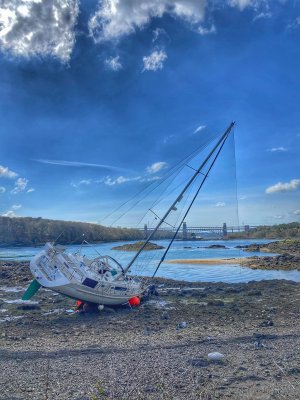rbmatthews
Member
I have a dilemma. We are keeping our boat in the Baltic with its low salinity, and I have been advised that it is better to switch from zinc to aluminium anodes for everything, as they work well both in sea water and brackish water, whereas zinc only works well in seawater. My understanding though is that you shouldn’t mix aluminium and zinc anodes due to the difference in anodic activity, the aluminium being the more active of the two, meaning that it will protect any zinc anode from doing its job. Therefore anodes should be either all aluminium or all zinc.
So far, so good. However, I have discovered that the anode on the Vetus bow thruster only comes in a zinc version. That would suggest that I must have everything in zinc. However, Vetus themselves have said that it is quite OK to mix zinc and aluminium anodes, which contrasts with most other advice I have had. Which is right, and what should I do?
The boat is a Jeanneau SO39i and the hull is GRP, not aluminium, if that is relevant. I am not sure if Vetus’s advice is based on the possibility that the bow thruster is electrically isolated from the rest of the boat’s electrical system (it has its own dedicated battery and relay system to the controls), but I have not been able to check this as the boat is in Sweden at the moment. In any case, I am not sure if the thruster system is actually isolated anyway as I presume it is connected to the main battery charger to keep its battery topped up.
I have already read Vyv Cox’s article, and a few other posts on here. It seems like it might be OK to mix the metals, but confirmation or otherwise would be good.
So far, so good. However, I have discovered that the anode on the Vetus bow thruster only comes in a zinc version. That would suggest that I must have everything in zinc. However, Vetus themselves have said that it is quite OK to mix zinc and aluminium anodes, which contrasts with most other advice I have had. Which is right, and what should I do?
The boat is a Jeanneau SO39i and the hull is GRP, not aluminium, if that is relevant. I am not sure if Vetus’s advice is based on the possibility that the bow thruster is electrically isolated from the rest of the boat’s electrical system (it has its own dedicated battery and relay system to the controls), but I have not been able to check this as the boat is in Sweden at the moment. In any case, I am not sure if the thruster system is actually isolated anyway as I presume it is connected to the main battery charger to keep its battery topped up.
I have already read Vyv Cox’s article, and a few other posts on here. It seems like it might be OK to mix the metals, but confirmation or otherwise would be good.

